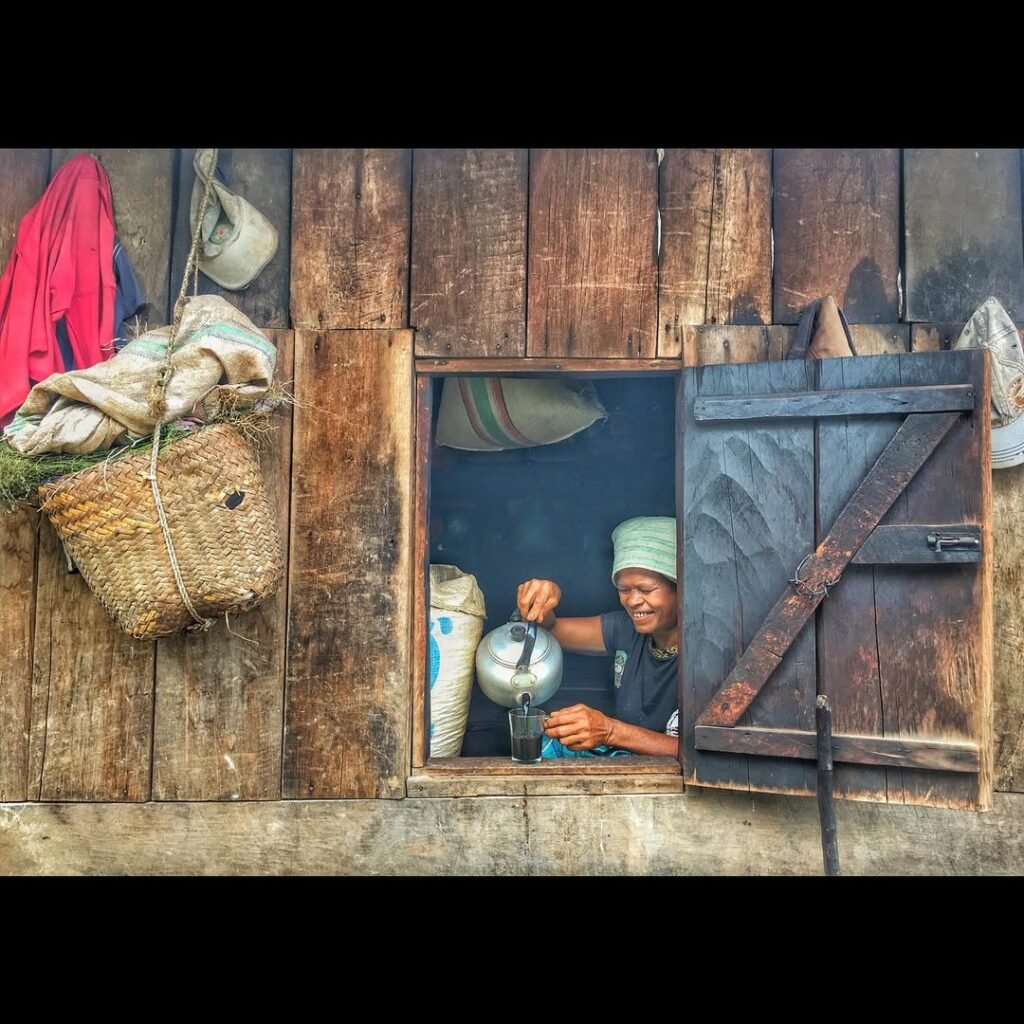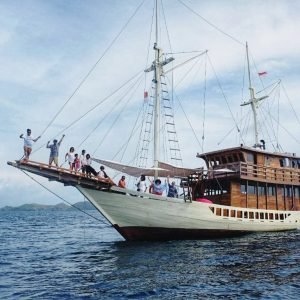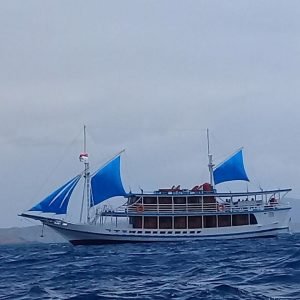Introduction to Flores Coffee
Flores Coffee, a distinguished variety hailing from Indonesia, exemplifies the intricate relationship between geography and coffee cultivation. Nestled within the lush landscapes of East Manggarai, Flores Island offers a unique combination of volcanic soil, high altitudes, and a distinctly tropical climate. These factors contribute significantly to the remarkable flavor profile that characterizes Flores Coffee, including its vibrant acidity and rich body, often accompanied by notes of dark chocolate and fruits. The Colol region, in particular, has emerged as a notable producer, garnering attention for its richly aromatic coffee beans.
Indonesia is renowned for its diverse coffee culture, and Flores Coffee serves as a testament to this narrative. Unlike other Indonesian coffee varieties such as Sumatra or Java, Flores Coffee is less widely recognized internationally, yet it holds substantial cultural and economic importance for local communities. The coffee industry in East Manggarai supports numerous farmers, who practice sustainable cultivation methods that respect the environment and honour traditional agricultural techniques.
As global demand for specialty coffee continues to rise, the reputation of Colol’s coffee from East Manggarai is steadily growing. This region, with its idyllic climate and traditional cultivation practices, offers a unique coffee experience that stands out in a competitive market. In this blog post, we aim to explore in-depth the rich history and cultural significance of Flores Coffee, examining the meticulous cultivation practices that influence its flavor and the socio-economic impact it has on the local communities. From historical narratives to modern challenges faced by farmers, our exploration will provide a comprehensive understanding of this fascinating aspect of Indonesian coffee heritage.
The Historical Roots of Coffee in Flores
The journey of coffee in Flores can be traced back to the 18th century when Dutch colonizers first introduced the crop to the region. Recognizing the potential of Indonesia’s diverse climate for coffee cultivation, the Dutch began to establish plantations, which led to the establishment of coffee as a commercial agricultural product. Initially, coffee was cultivated on a larger scale in other regions of Indonesia, but it found a unique niche in Flores, particularly in the East Manggarai area.
The introduction of coffee farming brought about significant changes in the local agrarian practices. Traditional crops yielded to the new commodity, and local farmers adapted by learning the techniques necessary for coffee cultivation. As coffee plantations spread, so too did the knowledge of various cultivation and processing methods, culminating in the development of what is now known as Colol coffee, a local specialty created by East Manggarai farmers. This coffee is celebrated not just for its flavor but also for the cultural significance it holds within the community.
Stories abound of how family farms transformed over generations, often passed down through family lines, maintaining their unique practices and contributing to the community’s identity. Local farmers have witnessed how their efforts boosted the economy and brought greater diversity to their agricultural landscape. Many farmers today proudly recount tales of the challenges and rewards of coffee farming, illustrating a deep connection to their land and heritage.
As coffee cultivation evolved, it became more than just an economic activity – it turned into a cornerstone of social life in East Manggarai. The communal aspect of coffee farming, from planting to harvest, has fostered strong relationships among farmers, thus enriching the cultural tapestry of Flores. Each cup of Colol coffee represents not only a beverage but a rich narrative of resilience, adaptation, and community spirit enveloped in the scenic beauty of East Manggarai.
The Unique Growing Conditions of East Manggarai
East Manggarai, located in the western part of Flores, Indonesia, offers a unique environment that significantly contributes to the distinct flavor profile of Colol’s coffee. This region is characterized by a combination of climate, altitude, soil composition, and traditional farming methods that collectively enhance the quality of the coffee produced here.
The climate in East Manggarai is classified as tropical, featuring a distinct wet and dry season. The average temperatures range between 24 to 28 degrees Celsius, creating a suitable environment for coffee cultivation. The rainfall is abundant, especially during the wet season, which is vital for the coffee plants during their flowering and fruiting stages. The well-distributed rainfall ensures that the coffee cherries receive the necessary hydration without the risks associated with prolonged droughts.
Altitude plays a crucial role in coffee quality, and East Manggarai is blessed with elevated terrains ranging from 800 to 1,500 meters above sea level. At such altitudes, the cooler temperatures slow down the maturation of coffee cherries, allowing for more complex flavor development. The elevation also provides an ideal environment for Arabica coffee, which is known for its superior flavor compared to Robusta varieties.
The soil composition in East Manggarai comprises volcanic soils rich in nutrients, which further bolsters the growth of vibrant coffee plants. These soils are well-draining and help support the health of coffee trees, ultimately impacting the beans’ flavor. The traditional farming methods employed by local farmers, often organic or semi-organic, further contribute to the rich taste of the coffee. Practices such as shade-growing ensure that coffee plants thrive while preserving the surrounding biodiversity.
The interplay of these factors – specific climate conditions, suitable altitude, nutrient-rich soil, and traditional farming practices – results in an exceptional cup of coffee that proudly represents the unique heritage of East Manggarai.
Cultivation and Harvesting Practices
The cultivation of coffee in East Manggarai, particularly the renowned Colol’s Coffee, is a practice steeped in tradition, marked by a deep connection to the land and its seasonal rhythms. Local farmers typically engage in a cyclical process that begins with land preparation in the dry season, where careful attention is given to the soil’s health. Farmers often incorporate organic fertilizers sourced from local materials, which is vital in maintaining soil fertility and ensuring high-quality bean production. Given the mountainous topography of East Manggarai, the coffee plants are primarily cultivated on terraced farms, which helps prevent soil erosion and supports sustainable farming practices.
The planting season usually coincides with the onset of the rainy season, as sufficient rainfall is crucial for the germination of coffee seeds. The choice of coffee variety is significant, as local farmers cultivate Arabica beans known for their rich flavor and aromatic profile. To ensure optimal growth and fruiting, farmers practice selective pruning, removing branches that hinder airflow and light penetration. This meticulous care enhances not only the quantity but also the quality of the coffee cherries.
Once the coffee cherries reach maturity, typically between eight to nine months after flowering, the harvesting process commences. This labor-intensive task is predominantly manual, as farmers hand-pick only the fully ripened cherries to guarantee superior quality. This selective harvesting technique is vital to producing premium coffee, as unripe fruits compromise flavor integrity. Following the harvest, the cherries undergo processing methods, including pulping and drying, which further enhance their distinct characteristics.
In conjunction with these traditional practices, the emphasis on sustainability plays a pivotal role. Farmers in East Manggarai are increasingly adopting eco-friendly methods aimed at protecting the environment while preserving the unique flavors of their coffee. This commitment to sustainable cultivation and responsible harvesting ensures that Colol’s Coffee continues to thrive, reflecting the rich heritage and cultural significance of the region.
The Processing Methods of Colol’s Coffee
The journey of Colol’s coffee from cherry to cup involves several meticulous processing methods that significantly impact its flavor profile. This cherished coffee is primarily found in East Manggarai, and producers utilize an array of traditional techniques that have been refined over generations. The first step begins with the careful handpicking of ripe coffee cherries, as only the best quality cherries contribute to the premium flavor that Colol’s coffee is celebrated for.
Once harvested, the cherries undergo a processing method known as wet processing. This method is particularly favored in East Manggarai due to its ability to enhance the coffee’s intrinsic flavors. During wet processing, the cherries are first subjected to a depulping machine that removes the outer skin. Following depulping, the cherries are fermented in water for a period ranging from 12 to 48 hours. This fermentation process is critical as it helps to dissolve the mucilage surrounding the beans, leading to a cleaner taste profile.
After fermentation, the beans are thoroughly washed to remove any remaining mucilage, and subsequently, they are spread out to dry under the sun. This drying stage can take several days and is essential for reducing the moisture content of the beans to ensure their longevity and prevent spoilage. Once dried, the coffee beans are hulled, which entails removing the parchment layer that safeguards the beans. Finally, the beans undergo a sorting process where they are inspected and classified based on size, weight, and quality. This final step ensures that only the finest beans are selected for roasting, ultimately preserving the rich flavors associated with Colol’s coffee.
Cultural Significance of Coffee in East Manggarai
In East Manggarai, coffee is not merely a beverage; it is deeply woven into the social fabric of community life and cultural traditions. The significance of coffee goes beyond its economic impact, permeating social gatherings, ceremonies, and daily practices of the residents. The local variety, known for its unique flavors and aromas, is a source of pride for the communities who cultivate it.
Socially, coffee serves as a central element in various gatherings. From simple family get-togethers to larger community celebrations, coffee is often the drink of choice that fosters conversation and camaraderie. As guests arrive, they are typically offered a cup of locally brewed coffee, which signifies hospitality and warmth. This local custom of sharing coffee reflects the strong social bonds that are prevalent in East Manggarai.
Moreover, coffee plays a crucial role in traditional ceremonies. Whether it is a wedding, a funeral, or a harvest festival, coffee is present as a symbol of respect and unity. During these ceremonies, special rituals may involve preparing and serving coffee in a way that honors the occasion, contributing to community identity and cultural continuity. This practice emphasizes not only the importance of coffee as a beverage but also its role in symbolizing relationships and cultural heritage.
The production of coffee also shapes the community identity of East Manggarai. The pride taken in cultivating high-quality coffee beans enhances the sense of belonging among residents. This pride motivates farmers to engage in sustainable practices that preserve not only the land but also the traditions associated with coffee cultivation. In doing so, they contribute to the overall cultural narrative of the region, ensuring that the legacy of coffee remains influential in East Manggarai.
Challenges Facing Flores Coffee Farmers
The coffee farmers in East Manggarai, particularly those involved in the production of Flores coffee, face a multitude of challenges that greatly affect their livelihoods and the quality of their product. One of the most significant issues confronting these farmers is climate change. The region has experienced unpredictable weather patterns, including irregular rainfall and increasing temperatures. These fluctuations can lead to poor coffee quality, reduce crop yields, and threaten the sustainability of traditional farming methods. As a result, many farmers are now seeking adaptive strategies that not only ensure their survival but also maintain the unique characteristics of Flores coffee.
Market access presents another substantial hurdle for these farmers. Despite the high quality of Flores coffee, many growers struggle to connect with buyers beyond local markets. The lack of infrastructure, such as adequate roads and transportation options, hampers their ability to transport coffee to larger markets. This limited access often results in lower prices for their products, making it challenging to cover the costs of production and invest in improving their farming practices. Farmers are increasingly advocating for improved trade networks that can facilitate access to wider markets and fairer prices, allowing them to thrive in a competitive landscape.
Additionally, competition from other coffee-producing regions poses a threat to the economic viability of Flores coffee. Regions such as Sumatra and Sulawesi have established themselves as key players in the national and international coffee markets, often overshadowing Flores coffee in terms of brand recognition and sales. This competition puts pressure on East Manggarai farmers to enhance their practices and market their coffee effectively. By emphasizing the unique qualities of their product and focusing on value-added practices, farmers can improve their standing in the marketplace, but this requires both investment and support.
The Future of Coffee in East Manggarai
The coffee industry continues to evolve, and East Manggarai is poised to play a significant role in this transformation. As global demand for unique and high-quality coffee grows, producers in this region, particularly those focusing on Colol’s coffee, are presented with a myriad of opportunities. A trend gaining traction is the increasing consumer preference for specialty coffee. Recognizing this shift, many farmers in East Manggarai are adapting their cultivation and processing methods to cater to the specialty market, which often emphasizes unique flavors and sustainable practices.
Another avenue for growth lies in the adoption of sustainable agricultural techniques. Ensuring environmental sustainability is becoming paramount not only for regulatory compliance but also for meeting consumer expectations. East Manggarai’s coffee producers are increasingly recognizing the importance of organic farming and environmentally-friendly practices, which can enhance the quality of the beans while also attracting conscientious buyers. As awareness of climate change grows, these sustainable practices may lead to long-term benefits for both the environment and local communities.
Furthermore, collaborations between local coffee producers and international buyers can significantly enhance market access for East Manggarai’s Colol coffee. Establishing partnerships with foreign importers and specialty coffee roasters can offer producers valuable insights into global market trends, expanding their reach and ensuring fair pricing for their quality beans. Initiatives such as coffee expos and international trade shows also present vital platforms for local producers to showcase their product, fostering a sense of community and collaboration.
Looking ahead, the future of coffee in East Manggarai appears promising. By leveraging its unique heritage, focusing on quality, and embracing sustainable practices, Colol’s coffee can carve out a niche in the global coffee market. As producers adopt innovative approaches and collaborate effectively, East Manggarai can well position itself as a key player in the coffee industry’s ongoing evolution.
Conclusion: Celebrating the Legacy of Colol’s Coffee
As we delve into the rich history and vibrant culture of Flores Coffee, it becomes clear that the legacy of Colol’s Coffee in East Manggarai extends far beyond a mere beverage. This coffee variety, cultivated by dedicated local farmers, is a testament to centuries of tradition, familial connections, and an unwavering commitment to quality. Each cup of Colol’s Coffee reflects not only its deep-rooted agricultural practices but also the resilience and wisdom of the communities involved in its production.
The pride that East Manggarai farmers take in their work is palpable. They invest significant time and effort into nurturing coffee plants in the region’s unique climate and volcanic soil, which contribute to the distinctive flavors of Flores Coffee. It embodies a relationship with the land that goes beyond economics; it is an integral aspect of their cultural identity. From traditional cultivation methods to modern sustainable practices, the journey of coffee production in this region encapsulates a broader narrative about environmental stewardship and community empowerment.
As consumers, we hold the power to support these communities by making conscious choices about the coffee we consume. By choosing Flores Coffee, not only do we relish the exceptional taste that comes from its rich heritage, but we also endorse sustainable practices that ensure the future of coffee farming in East Manggarai. It is essential to recognize the artistry and labor behind each cup, which allows us to cultivate a deeper appreciation for this renowned Indonesian coffee. We encourage readers to explore the nuances of Flores Coffee and to consider their role in preserving this legacy, thereby fostering a stronger connection to the farmers who cultivate this extraordinary product.








